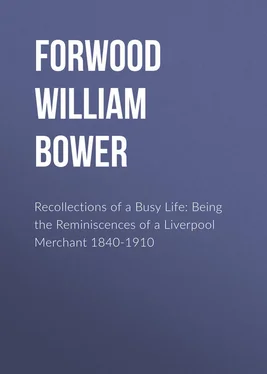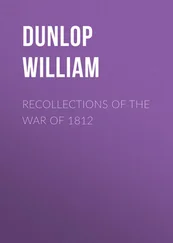William Forwood - Recollections of a Busy Life - Being the Reminiscences of a Liverpool Merchant 1840-1910
Здесь есть возможность читать онлайн «William Forwood - Recollections of a Busy Life - Being the Reminiscences of a Liverpool Merchant 1840-1910» — ознакомительный отрывок электронной книги совершенно бесплатно, а после прочтения отрывка купить полную версию. В некоторых случаях можно слушать аудио, скачать через торрент в формате fb2 и присутствует краткое содержание. Жанр: foreign_antique, foreign_prose, на английском языке. Описание произведения, (предисловие) а так же отзывы посетителей доступны на портале библиотеки ЛибКат.
- Название:Recollections of a Busy Life: Being the Reminiscences of a Liverpool Merchant 1840-1910
- Автор:
- Жанр:
- Год:неизвестен
- ISBN:нет данных
- Рейтинг книги:4 / 5. Голосов: 1
-
Избранное:Добавить в избранное
- Отзывы:
-
Ваша оценка:
- 80
- 1
- 2
- 3
- 4
- 5
Recollections of a Busy Life: Being the Reminiscences of a Liverpool Merchant 1840-1910: краткое содержание, описание и аннотация
Предлагаем к чтению аннотацию, описание, краткое содержание или предисловие (зависит от того, что написал сам автор книги «Recollections of a Busy Life: Being the Reminiscences of a Liverpool Merchant 1840-1910»). Если вы не нашли необходимую информацию о книге — напишите в комментариях, мы постараемся отыскать её.
Recollections of a Busy Life: Being the Reminiscences of a Liverpool Merchant 1840-1910 — читать онлайн ознакомительный отрывок
Ниже представлен текст книги, разбитый по страницам. Система сохранения места последней прочитанной страницы, позволяет с удобством читать онлайн бесплатно книгу «Recollections of a Busy Life: Being the Reminiscences of a Liverpool Merchant 1840-1910», без необходимости каждый раз заново искать на чём Вы остановились. Поставьте закладку, и сможете в любой момент перейти на страницу, на которой закончили чтение.
Интервал:
Закладка:
Merchant shipbrokers and general produce brokers transacted their business in the newsroom, while the cotton brokers, braving all weathers, were to be found on the "flags."
The present newsroom was opened in 1867, and shortly afterwards the Mayor, Mr. Edward Whitley, gave a ball in honour of Prince Arthur and the Prince and Princess Christian, the ballroom in the Town Hall being connected with the newsroom by a long corridor constructed of wood. Dancing took place in both rooms.
Upon several occasions after a heavy fall of snow, fights with snowballs were waged on the "flags," until, becoming serious, the police were obliged to interfere and put a stop to them. A playful seasonable exchange of snowballs degenerated into a combat with the rougher element which frequented the "flags."
I still recall many of the habitués of the Exchange from 1860 to 1870, men who well represented the varied interests of the great port. While frock coats and tall hats were the rule, many still wore evening dress coats, and not a few white cravats. There was old Miles Barton, a picturesque figure, with his genial smile, and his hat drawn over his eyes; Isaac Cook, the Quaker, in strictest of raiment; Harold Littledale, the friend of Birkenhead, and the critic of the Dock Board; Michael Belcher, the opulent and prosperous cotton broker; the two Macraes, the principal buyers of cotton for the trade; Tom Bold, the active Tory political tactician, who in olden days knew the value of every freeman's vote; H. T. Wilson, the founder of the White Star Line and the Napoleon of the Tory party; Edmund Thomson, the pioneer of steamers to the Brazils, who, like most pioneers, was unsuccessful; John Newall, the "king" of the cotton market, who had an enormous clientele of very wealthy men; C. K. Prioleau, the representative of the Confederate Government, who was also the great blockade runner. Mrs. Prioleau was considered to be the most beautiful woman in Liverpool. Mr. Prioleau built the house in Abercromby Square which the Bishop now occupies as his palace. R. L. Bolton, a very successful and bold operator in cotton, though in appearance the most shy and timid of men was another well-known figure; he rarely made his appearance until late in the day, being credited with a love of turning night into day. James Cox, the opulent bachelor, doyen of the nitrate trade, held his court always well attended in one corner of the room. I well remember J. Aspinall Tobin, tall of stature, distinguished in appearance, fluent of speech, a welcome speaker on every Tory platform; John Donnison, famous for his little dinners and excellent port; Sam Gath, the tallest man on the Exchange; Joseph Leather, the forceful partner in Marriotts, a leading nonconformist, who built and lived at Cleveley, Allerton; Maurice Williams, the writer of a cotton circular, and a reputed oracle on cotton – he lived at Allerton Priory, afterwards bought and rebuilt by Mr. John Grant Morris; Thomas Haigh, the courtly and stately chief of Haigh and Co., cotton brokers; Edwin Haigh, his son, and the most vivacious and talkative of men, popular with all; Lloyd Rayner and his brother Edward, the largest brokers in general produce; S. Bigland, plain and honest of speech; the two Reynolds, skilled in Sea Island and Egyptian cotton; John Joynson and his brother Moses; John Bigham, portly and prosperous; and not far away, his son, John C. Bigham, who was destined soon to leave the "room" and become the able Queen's Counsel, the learned President of the Admiralty and Divorce Court, and afterwards a peer of the realm (Lord Mersey), and whose brilliant career was doubtless largely due to his early business training; Studley Martin, the active secretary to the Cotton Brokers' Association, buzzing about like a busy bee, collecting opinions as to the amount of business doing in cotton; Thos. Bouch, the dignified representative of the old firm of Waterhouse and Sons; Edgar Musgrove, an ideal broker, ever present and ever active. Nor must I forget the noble band of shipbrokers who collected the cargoes for ships loading outwards: Robert Ashley, Louis Mors, W. J. Tomlinson, J. B. Walmsley, John McDiarmid, Robert Vining, Dashper Glynn, Tom Moss, G. Warren, S. B. Guion, all of whom, with many others, represented vigorous interests which in those days made the trade of Liverpool.
Outside the Exchange, but yet very necessary to the success of its business, were the lawyers and insurance brokers and average adjusters. Amongst lawyers Mr. Bateson and Mr. Squarey enjoyed the largest commercial practice; R. N. Dale was the leading underwriter; and Mr. L. R. Baily was not only very prominent as an average adjuster, but as an arbitrator he afterwards became one of the members for Liverpool. In those days, before the establishment of the system of trade arbitrations, there was abundant employment for lawyers and professional arbitrators.
A sketch of the Liverpool Cotton Exchange would not be complete without a reference being made to the dealings of Maurice Ranger, and others, who in the 'seventies on several occasions tried to corner the market by buying "futures" for delivery in a given month, and then obtaining such a control of the spot market as would prevent the sellers fulfilling their contracts. Mr. Ranger's operations were on a gigantic scale, but there was always a "nigger on the fence." The unexpected happened, and I do not think he ever fully succeeded in these enterprises. He had many imitators, who were equally unsuccessful. Mr. Joseph B. Morgan did a useful work for the cotton trade, by establishing the cotton bank to facilitate clearances in future contracts.
The removal of the Cotton Exchange to the new premises has taken place since my active business days, and the whole course and methods of the trade have changed.
Commerce
In the 'sixties, sailing-ships filled the Liverpool docks, and fully one-half of them flew the American flag. The great trades of Liverpool were those carried on with America, Australia, Calcutta, and the West Coast. The clipper ships belonging to James Baines and Co., and H. T. Wilson and Co., were renowned for their fast passages to Melbourne, while the East India and West Coast ships of James Beazley and Co., Imrie and Tomlinson, McDiarmid and Greenshields, and the Brocklebanks were justly celebrated for their smartness and sea-going qualities. Charles MacIver ruled over the destinies of the Cunard Company, and this line then paid one-third of the Liverpool dock dues. Mr. MacIver was a man of resolute purpose, and a power in Liverpool; in the early volunteer days he raised a regiment of field artillery, 1,000 strong, which he commanded. Many stories are told of his stern love of discipline. A captain of one of the Mediterranean steamers asked his permission as a special favour to be allowed to take his wife a voyage with him. Mr. MacIver whilst granting the request, remarked that it was contrary to the regulations of the Cunard Company. The captain, upon proceeding to join his ship with his wife, to his surprise found another captain in command, and a letter from Mr. MacIver enclosing a return passenger ticket for himself and his wife. William Inman was building up the fortunes of the Inman Line, and was the first to study and profit by the Irish emigration trade. The Bibbys and James Moss and Co. practically controlled the Mediterranean trade. The "tramp" steamer was then unknown, and outside the main lines of steamers there were few vessels; but the Allans were forcing their way to the front, and Mr. Ismay was establishing the White Star Line, which revolutionised Atlantic travel. Mr. Alfred Holt was doing pioneer work in the West India trade, with some small steamers with single engines. These he sold and went into the China trade, in which he has built up a great concern.
The Harrisons were sailing ship owners, but they had also a line of small steamers trading to Charente. They afterwards started steamers to the Brazils and to Calcutta. Looking back, they appear to have been most unsuitable vessels, but freights were high, and to Messrs. T. and J. Harrison belongs the credit of quickly finding out the most suitable steamer for long voyages, and always keeping their fleets well up to date.
Читать дальшеИнтервал:
Закладка:
Похожие книги на «Recollections of a Busy Life: Being the Reminiscences of a Liverpool Merchant 1840-1910»
Представляем Вашему вниманию похожие книги на «Recollections of a Busy Life: Being the Reminiscences of a Liverpool Merchant 1840-1910» списком для выбора. Мы отобрали схожую по названию и смыслу литературу в надежде предоставить читателям больше вариантов отыскать новые, интересные, ещё непрочитанные произведения.
Обсуждение, отзывы о книге «Recollections of a Busy Life: Being the Reminiscences of a Liverpool Merchant 1840-1910» и просто собственные мнения читателей. Оставьте ваши комментарии, напишите, что Вы думаете о произведении, его смысле или главных героях. Укажите что конкретно понравилось, а что нет, и почему Вы так считаете.








![William Frith - John Leech, His Life and Work. Vol. 1 [of 2]](/books/747171/william-frith-john-leech-his-life-and-work-vol-thumb.webp)

![William Frith - John Leech, His Life and Work, Vol. 2 [of 2]](/books/748201/william-frith-john-leech-his-life-and-work-vol-thumb.webp)

